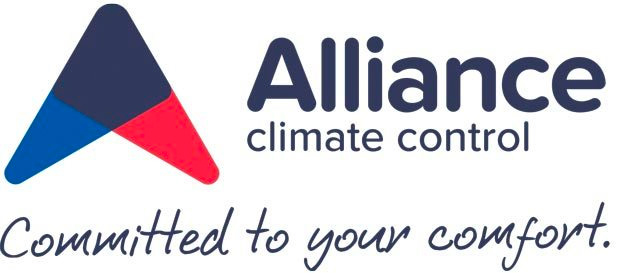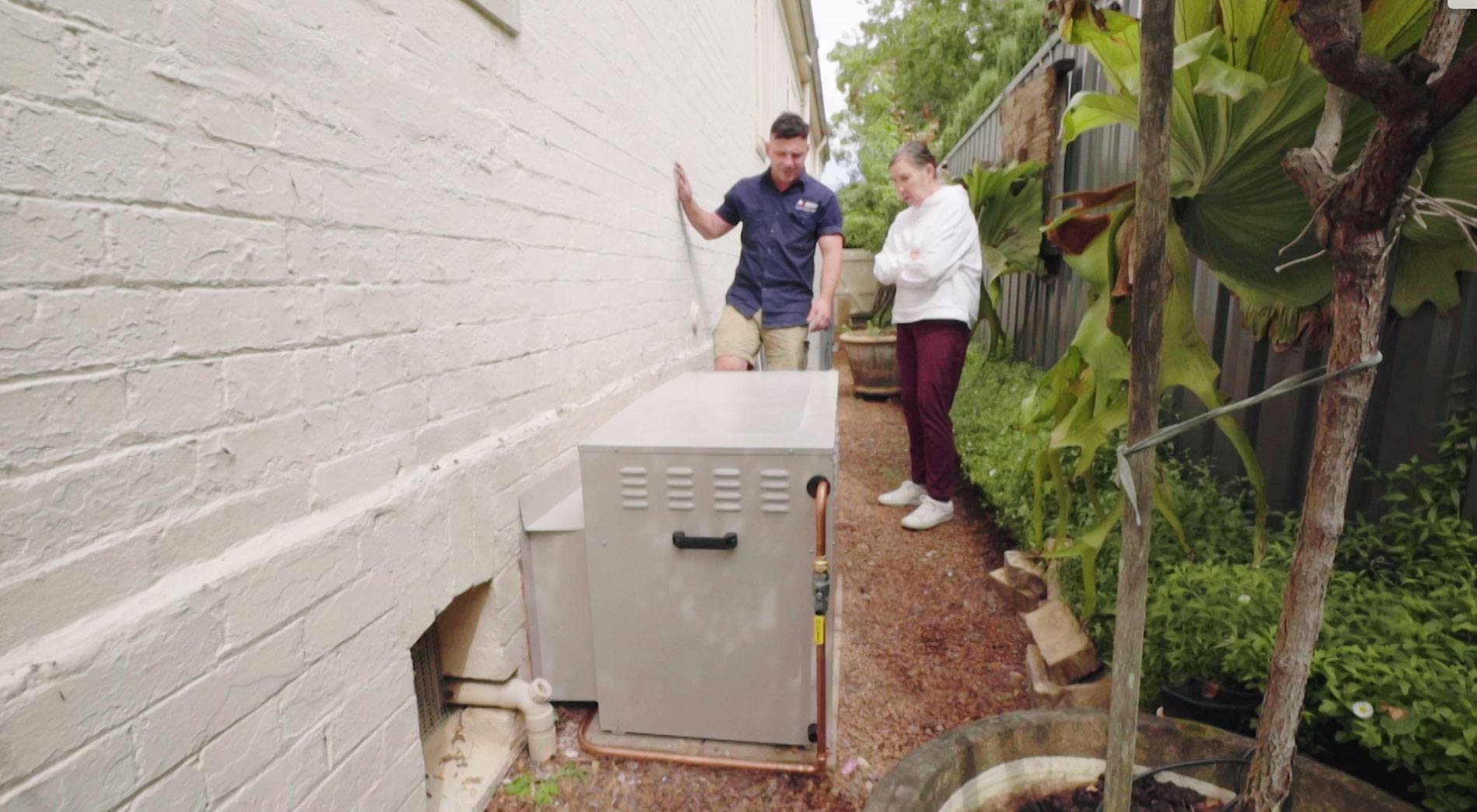

If you’re like most Australians, you’re probably considering ducted gas heating as a way to keep you warm throughout the year. Ducted gas heating is convenient and has many benefits, but one of the primary concerns when it comes to heating is how expensive it is to install and run.
Ducted gas heating installation in Australia costs anywhere between $3,000 to $8,000 on average, including supply and installation. Typical running costs for ducted gas heating range from 11c to 20c per kWh, or $835 to $1250 annually (compared to 30c per kWh for reverse cycle heating).
Although this may seem expensive at first glance, this is much cheaper than heating your home with reverse cycle air conditioning, which costs approximately 30c per kWh. Note that all figures in this article are cost estimates, and real costs will vary depending on your property, energy retailer and usage habits.
Ducted gas heating systems offer various advantages over more traditional heating solutions and are one of the most efficient ways to heat your home. Ducted gas heaters can zone different rooms to only heat areas in use, saving you money by not heating large, unused areas.
If you want to find out how ducted gas heating installation can heat your home more efficiently for less money, don’t worry. We’ve got everything you need to know right here in this article.
Call Now and Save Up To $1200 with our Exclusive Online Trade-In Offer
Gas Central Heater
Installation
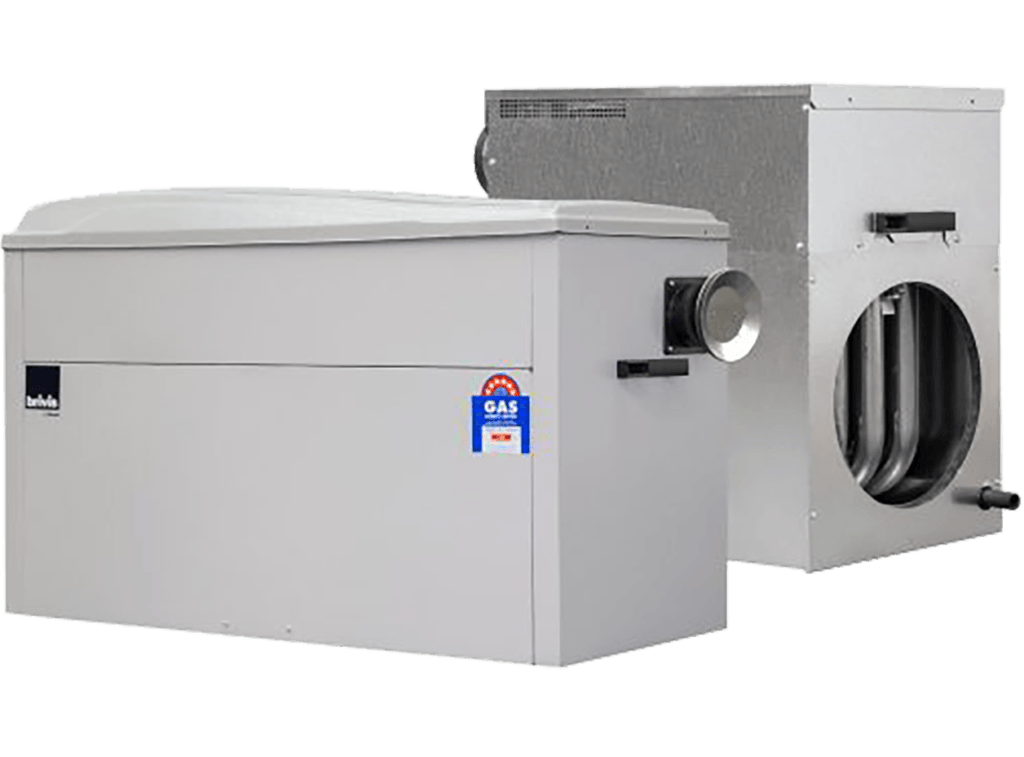
Up to
$500 Off
With any new central
gas heater supply and install*
Limited time only, offer ends .
*Offer to be presented at point of booking or sale. Not to be combined with any other offer.
*Offer to be presented at point of booking or sale. Not to be combined with any other offer.
Trade in your old
system
system
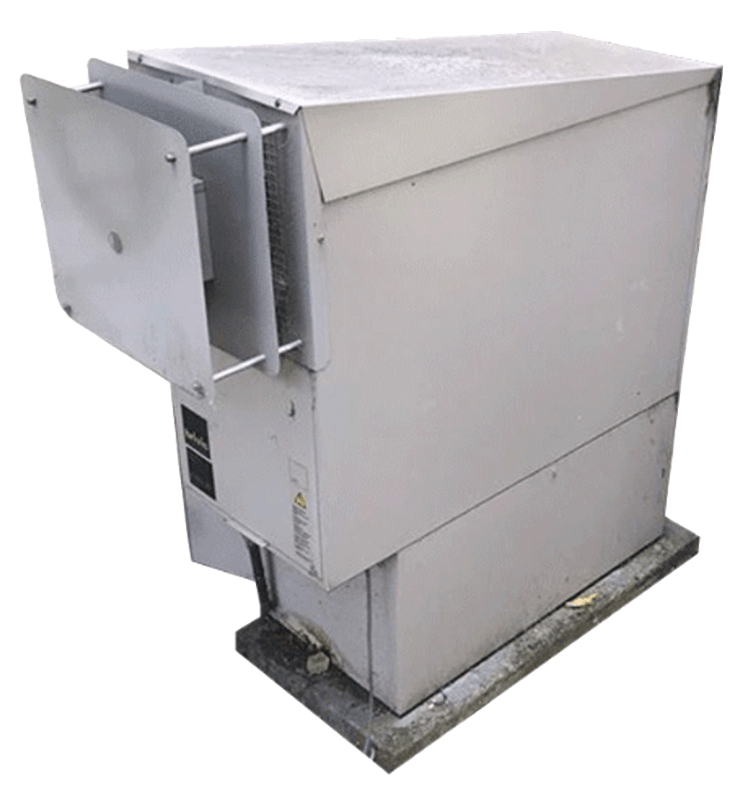
Up to
$700 Off
With any air con or gas heater replacement trade in*
Limited time only, offer ends .
*Offer to be presented at point of booking or sale. Not to be combined with any other offer.
*Offer to be presented at point of booking or sale. Not to be combined with any other offer.
Air Conditioning
Installation
Installation

Up to
$500 Off
With any new Air conditioning
supply and installation*
Limited time only, offer ends .
*Offer to be presented at point of booking or sale. Not to be combined with any other offer.
*Offer to be presented at point of booking or sale. Not to be combined with any other offer.
Schedule an appointment with
one of our specialists today.
Why is Ducted Gas Heating so Popular in Australia?
Reasons such as cost-effectiveness, safety, and cleanliness are what make ducted gas heating more and more popular for heating Aussie homes. The many benefits of gas ducted heating have lead to more and more new installations each year.
The versatility and convenience of a ducted system are why they have become so popular in homes around Australia. The ability to zone your heating to different rooms makes it ideal for almost every house, as you’ll have unparalleled control over which rooms are heated and how much airflow they receive. The two primary options are ducted gas heating and reverse-cycle air conditioners, which can be installed as an electric ducted heating system.
Ducted gas heating is a home heating system that uses LPG or natural gas. A ducted gas system is equipped with an external furnace where cool air is passed through the furnace onto a heat exchanger, heating it in preparation for circulation. The air is pumped into the other areas of the house through a system of outlets and ducts.
The beauty of a ducted system is that you can control which ducts are active, allowing you to keep living areas warm during the day and bedrooms toasty overnight. Lastly, the air is then syphoned back up through a return mounted on the walls or ceilings of the house, entering the system for recirculation.
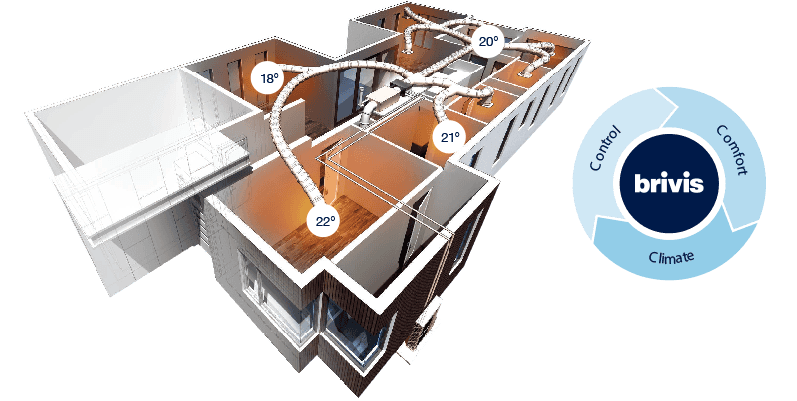
How Much Does Gas Ducted Heating Cost to Install in Australia?
Ducted gas heating systems cost between $3,000 to $8,000 in Australia, including the heating unit and installation costs. Large properties or complex installations can be up to $10,000. More energy-efficient heating units also have a higher upfront cost, but you’ll save more on long-term running costs.
A full-service quote for ducted gas heating installation will include:
- On-site consultation
- Heating system design
- The gas heating unit itself
- Supply of ductwork
- Delivery of all components
- Installation of heating unit & ductwork
- Testing of the fully installed system
The cost of installing ducted has heating is significantly cheaper than the cost to install ducted reverse-cycle electric heating.
The biggest factor in the installation cost of ducted heating will be the size of your system and the details of the unit you plan on installing. The exact cost of a ducted gas heater will depend mostly on the system’s overall capacity.
Gas ducted heating systems units for domestic use normally range from 14kW to 35kW. A 14kw heating unit can heat a total area of up to 130 square metres, while a 35kW heating unit heats a maximum area of 325 square metres.
You will notice that systems with a higher energy star rating cost more upfront, but remember that these will also save you more in energy costs over time. Other factors that affect the price of the system include features such as a ‘zone system’, which gives the homeowner much greater control over the individual temperature settings for each room.
The cost of installing a new ducted gas heating system will also depend on the required amount and type of ductwork.
Below is the approximate cost of the three most common types of heating ductwork:
| DUCTWORK TYPE | COST PER METRE | PROS | CONS |
| Flexible Heating Ducts | $2 – $4 | Cheapest & most versatile | Least durable & prone to airflow restriction |
| Fibreboard Heating Ducts | $9 – $12 | Minimises noise & well insulated | More difficult to keep clean |
| Sheet Metal Heating Ducts | $3 – $12 | Hardy & long-lasting | Most expensive & prone to leaks at joints |
To clarify what the ducted gas heating installation cost is, it is advisable to get separate supply and installation quotes when looking for ducted heating systems that run on gas. Having the supplier fit the system is a good cost-saving measure – you’ll typically get a lower price on the supply of a gas heating system through a gas heating contractor rather than trying to buy it separately.
How Much Does Ducted Gas Heating Installation Cost?
The installation costs of ducted gas heating vary depending on location and complexity. You can expect installation to cost between $1250 and $5000, or $60 to $100 per hour. Ducted systems which require more complicated ductwork to be installed increase the cost of installation.
Below is a table of the average ducted gas heating installation labour costs per hour across Australia:
| CITY | AVG DUCTED GAS HEATING INSTALLATION COST |
| Sydney | $25 per hour |
| Melbourne | $26 per hour |
| Brisbane | $27 per hour |
| Canberra | $28 per hour |
| Perth | $28 per hour |
| Darwin | $37 per hour |
| Hobart | $24 per hour |
| Adelaide | $27 per hour |
However, the overall installation costs for your ducted heating system will include other factors on top of the basic labour rate, and may require several gas heating technicians. This is why you can expect to pay $60 to $100 per hour for installation overall.
Depending on your installer’s qualification, you may even require several different trades, including gas fitters, heating specialists and electricians. However, if you choose a gas heating specialist with multiple qualifications, you can avoid the need to hire different tradespeople.
If you don’t already have a gas mains connection to your property, you may also need to add the cost of getting your property connected.
It’s important to ensure you use a quality gas heating installation company rather than opting for the cheapest price possible. Improper installation is the leading cause of gas heating system problems later down the track and may lead to premature replacement or repairs.
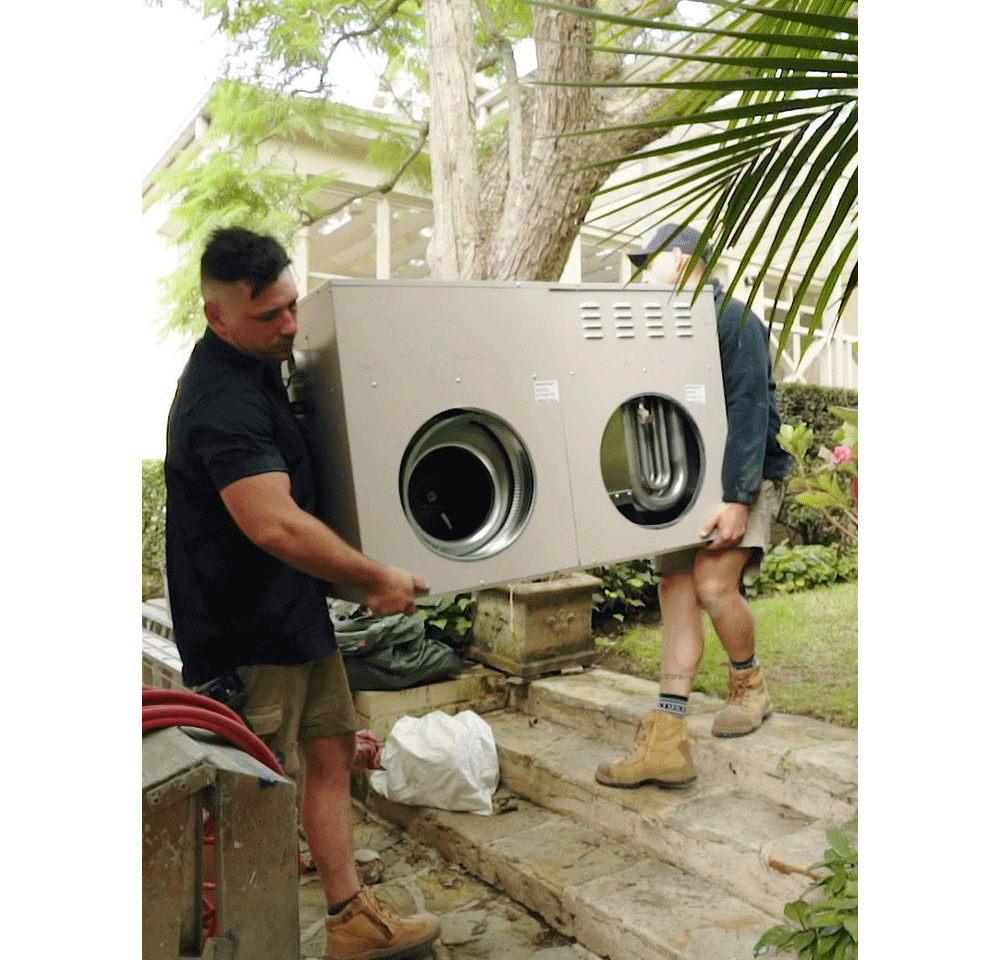
What Factors Affect the Cost of Ducted Gas Heating Installation?
The main factors that affect the cost of ducted gas heater installation are the size of your home and the height of your ceiling, the installation’s complexity and the heater’s model. These factors affect the installation’s difficulty, affecting the overall cost.
- Size of the House – As you would expect, a larger house will incur a higher installation cost. Larger homes will require a more powerful heating unit and more extensive ductwork to reach all areas of the property.
- Single or Double Storey Home – As a double-storey property will require vertical ductwork to be installed, this will increase the cost of installing the central heating system. You’ll also need a more powerful heating unit.
- The Complexity of Installation – For some houses, gaining access to install ductwork is complex, especially for older homes with an enclosed ductwork system. Since accessing the ductwork will require additional construction work and labour, an added cost will be included.
- Type of Ductwork – Ductwork can be made of varying materials, some more energy-efficient than others. Whether you need sheet metal, fibreboard or flexible ducting will significantly impact installation costs.
- Cooling Add-On Required – A gas ducted heating unit can only heat, so if you’re looking for a cooling add-on to utilise the same ductwork, you’ll need to pay for a separate unit. This can add to the upfront cost of installing the system as a whole.
- Brand and Model of the System – As with other heating and cooling systems, the model and make of the ducted gas heating system will affect the cost. Systems with higher energy efficiency (measured by the energy star rating) will incur a higher upfront cost, but the higher the star rating, the more cost-effective it will be to run the system.
- Zoning & Other Features – Two systems with the same capacity may vary in price because of extra features. For instance, a zone system is more costly because it gives you more control as it allows you to heat individual rooms separately. It is always important to carefully compare the different quotes in the market. The best system comes with the features you desire and is competitively priced.
To learn more about which brand to choose, see our Brivis vs Braemar ducted heating comparison guide.
How Much Does Ducted Heating Cost to Run in Australia?
In 2022, heating your home with ducted gas heating will cost around 11c to 15c per kWh with natural gas, or 17c to 20c per kWh for LPG (compared to 30c per kWh for electric heating). Annual running costs for ducted heating range between $635 and $1845 depending on the energy star rating and the size of your home.
This makes ducted gas heaters one of the cheapest heating systems to run. In contrast, using electricity instead to run an air conditioning and heating system will cost around 30 cents per kWh.
Although the exact values will still depend on factors such as the system’s efficiency, you will generally see energy costs drop when switching to gas ducted heating. As a fuel source, natural gas is up to 40% cheaper than electricity!
Ultimately, the running costs of your gas ducted heating system will depend on factors like:
- The size of your home
- Height of ceilings
- How well-insulated your property is
- Energy star rating of heating unit
- Whether your system uses natural gas or LPG
This table shows the approximate annual cost of running ducted gas heating:
| HOME SIZE | HEATING UNIT ENERGY STAR RATING | ANNUAL RUNNING COST (APPROX) |
| 100m2 | 3 Stars | $835 |
| 4 Stars | $735 | |
| 6 Stars | $635 | |
| 160m2 | 3 Stars | $1250 |
| 4 Stars | $1095 | |
| 6 Stars | $950 | |
| 220m2 | 3 Stars | $1645 |
| 4 Stars | $1445 | |
| 6 Stars | $1250 |
With those values in mind, even if you decide to keep your heating system running for around 8 hours a day for the entire year (365 days), you will still see some savings compared to other heating options.
Since heating comprises up to 60% of your household energy bill, reducing the cost to heat your home makes a big difference to your budget.
The Energy Star Rating significantly affects your ducted heating running costs.
Compared to a 3-star gas heating unit, Brivis research shows that on average:
- A 4-star system uses 13% less energy – annual savings of $236
- A 5-star system uses 22% less energy – annual savings of $420
- A 6-star system uses 30% less energy – annual savings of $567
This can quickly offset the additional upfront cost of purchasing a more energy-efficient gas heating unit.
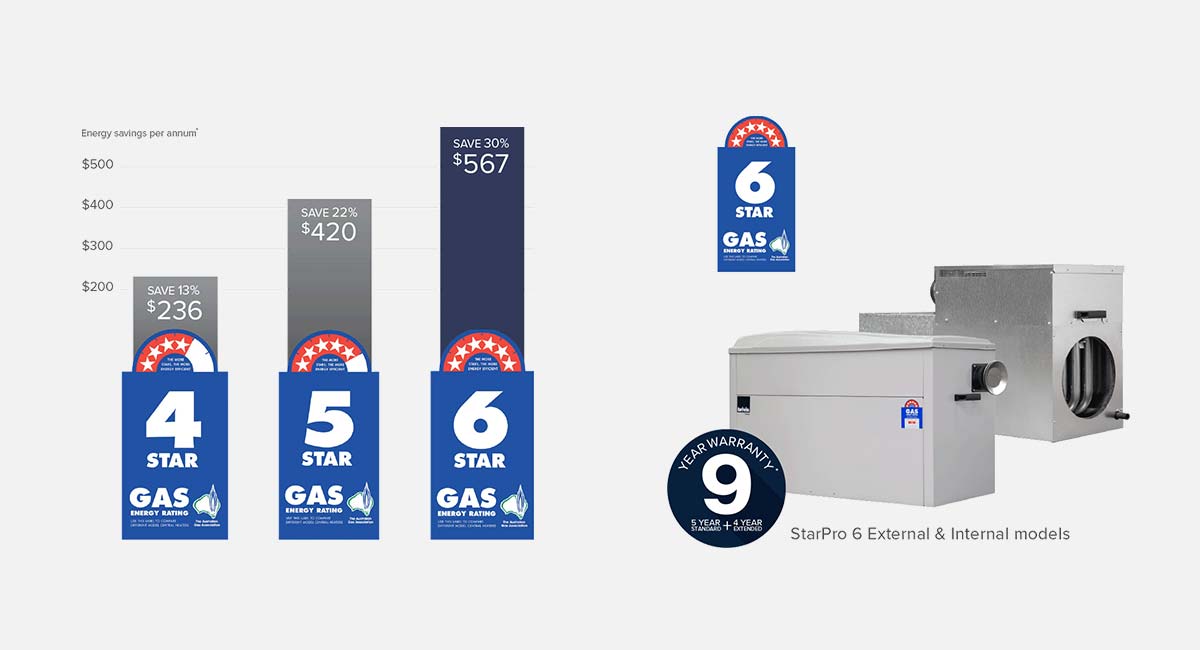
How to Calculate Ducted Gas Heating Running Cost
To calculate ducted gas heating running costs, you need to get the gas heating system’s energy consumption in Megajoules (MJ) and multiply this by the values found in your latest gas bill to get the hourly operating cost.
Gas ducted heating manufacturers usually list the system’s energy consumption in kilowatt-hours (kWh). To convert this to Megajoules, multiply the kWh value by 3.6.
Next, get a copy of your latest energy bill or the average gas usage rates in your state. Search for your current gas rate or simply use the average rate, then multiply it by the heating system’s energy consumption in MJ. The resulting number is the operating cost of your ducted gas heating system on an hourly basis.
Now that you have the hourly operating cost, you can determine the total cost for you by multiplying the hourly cost by the number of hours that the heating system runs in your home per day.
Multiply the daily operating cost by the number of days you generally use it per year. If you aren’t sure about this value, simply multiply it by the number of days it is expected to run during the colder months.
The resulting value is your approximate yearly operating cost for your ducted gas heating system.
Keep in mind that gas ducted heating systems still require a little bit of electricity to run some of their components, so consider this as part of your approximate annual operating costs. This is because modern heating units typically have a safer electric starter rather than a pilot flame.
Running Cost of Ducted Gas Heating vs Reverse Cycle Air Conditioning
The running costs of ducted gas heating systems in comparison to split system air conditioners are vastly different, and ducted gas is cheaper and more efficient than split system AC by a large margin.
The current average cost of ducted gas heating systems ranges from 11c to 20c per kWh, depending on whether the heating unit runs on natural gas or LPG. On the other hand, a split system air conditioning unit costs around 30 cents per kWh.
Unlike electricity billing – where higher consumption means higher unit cost – the unit cost of gas typically decreases the more you use. This makes gas heating even more cost-effective the larger your property is.
Below is a handy guide to visualise the different annual costs to run ducted heating systems in an average size 165m2 home:
The table below compares annual running costs for ducted gas heating and ducted split system heating.
| HEATER TYPE | ENERGY EFFICIENCY | YEARLY COST |
| 23 kW Zoned Ducted Gas Heater | 3.5 Star Rating | $790 |
| 5 Star Rating | $735 | |
| 6 Star Rating | $670 | |
| 23 kW Ducted Gas Heater | 3.5 Star Rating | $1,055 |
| 5 Star Rating | $980 | |
| 6 Star Rating | $895 | |
| 20kW Ducted Split System Heater | Standard Efficiency Model | $1220 |
| High-Efficiency Model | $1025 | |
| 20kW Zoned Ducted Split System Heater | Standard Efficiency Model | $915 |
| High-Efficiency Model | $770 |
Table above shows estimated annual running costs based on 900 hours of winter use. Figures are calculated based on electricity tariffs of 27.7 cents/kWh and natural gas tariffs of 1.50 cents/MJ.
The primary factor affecting the lower energy cost is the power source (gas is cheaper than electricity by a large margin) and how much area the system can cover inside a house. Your home’s insulation and climate region will also play a role, as well as your reverse cycle air conditioner temperature settings for winter.
When running costs are directly compared, it can often seem that reverse-cycle air conditioning is cheaper for heating. However, split system air conditioners are small units designed to cool smaller rooms, unlike ducted heating systems designed to heat the entire home. The need to run multiple reverse cycle air conditioners to achieve the same consistent heating makes ducted gas heating vastly more affordable.
Simply put, an air conditioner will never achieve the same efficiency and coverage that a ducted heating unit offers.
Running Cost of Ducted Gas Heating vs Electric Heating
The difference in the running costs of ducted gas heating systems compared to electric heating systems is significant, and you should expect to pay up to two or three times more for your energy bills if you choose electric over gas.
The current average cost of ducted gas heating systems ranges from 11c to 20c per kWh, depending on the system’s power source, while the cost per kWh for an electric heating system is around 30 cents.
When weighing your options on whether to go gas or electric regarding ducted heating, don’t simply focus on the cost of installation and supply but think long-term. You will discover that gas is much better than electricity in the following ways:
- Cost of installation is lower
- Reduced running costs
- Lower greenhouse emissions.
Most gas heating systems can either work with liquefied petroleum gas (LPG) or natural gas. Though LPG is more costly than natural gas, it is still less expensive than electricity. Electricity consumption is measured in kWh (kilowatt hours), while gas usage is measured in MJ/h (megajoules per hour). To compare the two rates, MJ/h is converted to kWh.
Heating systems that run solely on electricity are usually ducted reverse cycle air conditioners, which use refrigerants to cool and heat the air. Depending on the manufacturer and the age of your electric heater, consistently using electricity to heat your home can be quite costly. Although ducted heating specialises in heating, most systems can be installed with add-on cooling.
In Australia, gas is almost always more efficient than electricity on a practical level, so even after taking into account other relevant factors such as temperature settings, ambient temperature outside the house, the size of the house, its insulation, and even zoning capabilities, an electric heating system will always be more expensive to run than ducted gas heating systems.
How to Reduce Ducted Gas Heating Running Costs
There are a couple of ways to minimise ducted gas heating running costs, the most effective ways being regular servicing, not running the system at too high of a temperature and utilising the zoning functions.
Below are tips on reducing your ducted heating system’s energy costs:
Lower your thermostat – Having it set to anywhere between 18°C to 20°C is usually enough to keep you warm during the cold weather, but with the bonus of having lower energy bills. Be sure you understand the best temperature setting for your heater in winter.
Utilise zoning technology properly – Not every room has to be heated; this is especially true for homes where not all interiors are occupied. Make sure you only heat rooms where people gather, stay or visit regularly. Doing so ensures that every cent of your heating costs on your energy bill serves a meaningful purpose and saves you money.
Turn it off while you’re out – This may sound like a given, but you’d be surprised to know that not everybody turns off their heating systems even when nobody is around. This is usually done to ensure the house is warm whenever someone comes home. This, however, increases your energy bills dramatically. Make it a habit to turn off the heating system when nobody is home. Ducted heating systems can warm the house quicker than you would think, so having it on even when the house is empty isn’t necessary.
Improve your home’s insulation – Needless to say, a house that isn’t fully or properly insulated will present opportunities for heat to exit the home. This isn’t ideal as the heating system will work extra hard to keep the desired temperature. Make sure all windows, floors, and roofs are insulated. Keeping the heat trapped inside is just as important.
Retain heat naturally – Leave your curtains open during the day to take advantage of the natural heat coming from the Sun. Consequently, keep them shut at night.
Have your unit regularly serviced – Having the system regularly serviced can help you minimise running costs. Problems in your heating system will inevitably cause underperformance and lead to inefficiency, resulting in higher energy costs. Keeping running costs down is one of several reasons to service your ducted heating system.
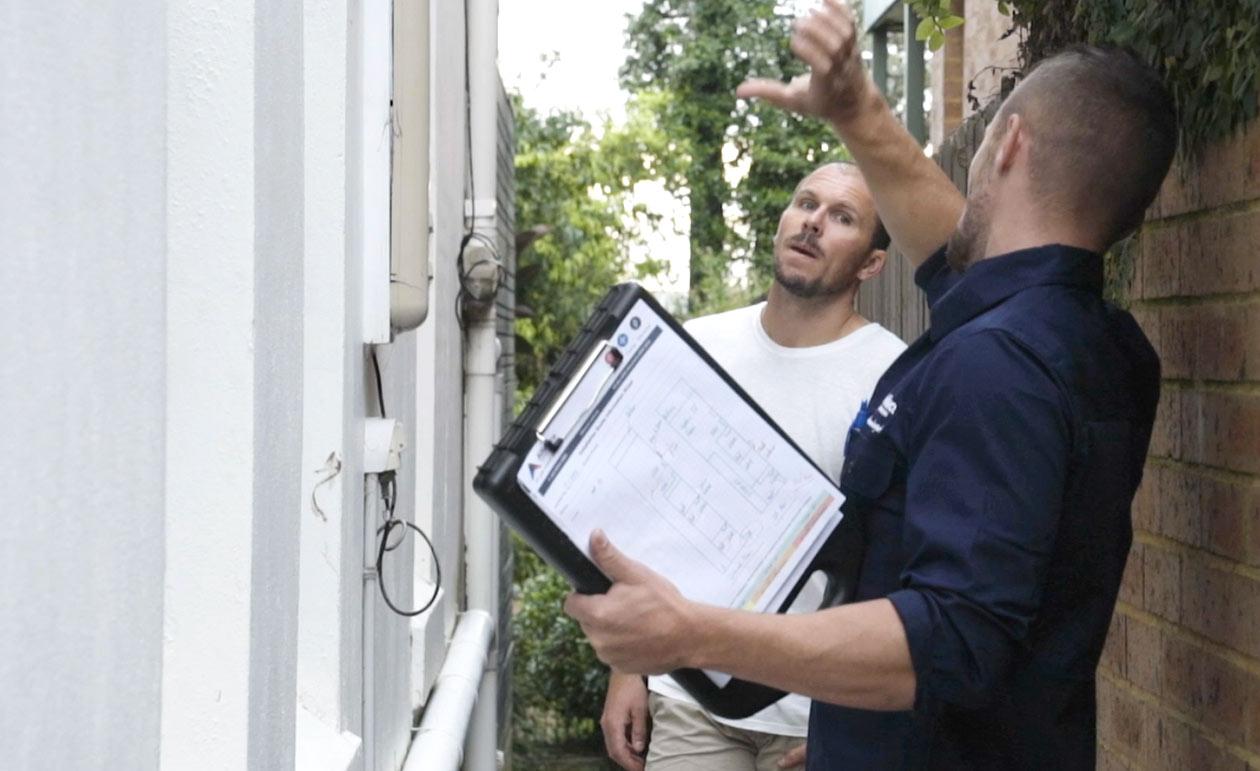
Is Ducted Gas Heating Worth It?
Yes, if you consider everything that ducted gas heating can offer, it is well worth investing in one despite its flaws. On top of their outstanding energy efficiency, these systems do not ‘intrude’ on your house’s style and design and offer centralised heating from just one unit.
The energy efficiency alone would be enough for smart homeowners to consider installing one. However, they come with a variety of other advantages, such as a centralised design that does not ‘disturb’ your house design, precise control for the entire house, zoning capabilities that even modern commercial air conditioners will not be able to replicate, and warmth that doesn’t dry out your eyes.
Some will argue that because it can only ‘heat’, air conditioners that offer heating and cooling will still be better. However, that doesn’t take into account the ducted heating system’s ability to have an add-on cooling option that will also utilise the same ductwork to cool the house, something that air conditioners (which are designed to cool a certain room size) will never be able to achieve due to design limitations.
Ducted gas heating systems offer so much more for the average homeowner that more and more people are opting to swap out their old heating systems for them and have one installed. Speak to your local heating specialist if you’re still on the fence about a ducted gas heating system. They will be able to let you know if a ducted gas heater is optimal for your home.
Get in Touch With Sydney’s Ducted Heating Experts
Our professional and friendly team at Alliance Climate Control want to ensure that all Sydney homes can enjoy the luxurious comfort of ducted gas heating. We provide quick and easy consultations with an expert technician who will give you an obligation-free quote.
We collaborate with the top heating firms in Australia, such as Brivis and Braemar, to ensure that our clients receive the most dependable installation.
At Alliance Climate Control, we guarantee that your new ducted gas heating system will be installed to perfection.
Keep your home cozy this winter with effective and efficient gas heating – reach out to us today for a personalised installation quote.
Offer Save
up to
$700
With any Air conditioning or Gas heater replacement installation trade in*
Limited time only, offer ends .
Not to be combined with any other offer
*Offer to be presented at point of booking or sale.
*Offer to be presented at point of booking or sale.
Request a Quote
Related Questions
Can I Combine Ducted Gas Heating With Air Conditioning?
Yes, it is possible to combine ducted gas heating with air conditioning. It’s commonly known as ‘add-on cooling’. Add-on air conditioning allows the same ducted gas heating system to use the condensing unit to blow cold refrigerated air through the same ductwork.
This option is considered by those who already have gas ducted heating and want an air conditioning system, but not another separate unit. When opting for this, remember that the add-on consists of separate outdoor and indoor units.
How Much Energy Does a Ducted Gas Heater Use?
Natural gas will cost anywhere from 11c to 15c per kWh, while LPG will cost anywhere from 17c to 20c per kWh. However, different brands and models of ducted gas heaters will affect how much energy they use. The energy efficiency star rating on all heaters indicates which systems use more or less energy.
How Much Does a Ducted Heating Unit Replacement Cost?
If you have an existing central heating system and only need to replace the unit itself, you can expect costs to be between $1250 and $2500. However, if your ductwork is worn out or damaged, you may be better off replacing it at the same time, as this can undermine the energy efficiency of your system.
Disclaimer:
This article is published in good faith and for general informational purposes only. It does not take into consideration your individual circumstances and does not constitute an estimate for any specific project. Alliance Climate Control does not make any warranties about the ongoing completeness, reliability and accuracy of this information. Individual costs and cost savings will vary depending on your property and usage habits.
